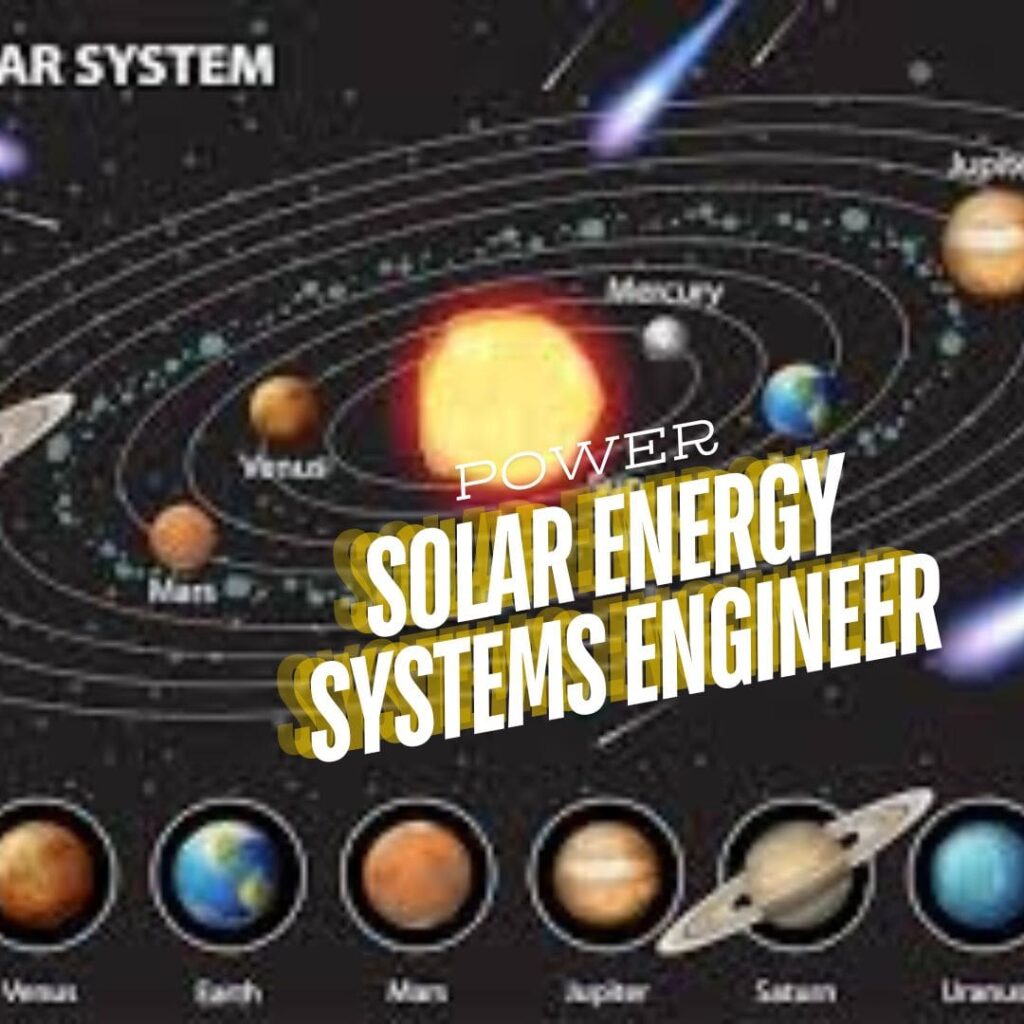Types Of Solar Energy Systems Engineer Discribe . Solar power refers to the power resulting from the sun’s energy. It is a renewable and fresh resource of power that can be attach in a variety of ways to make power heat water and seats and power a range of plans. Here are some key point about solar power or solar energy systems engineer.
Photovoltaic Systems:
PV systems change sunshine straight into power using solar cell complete of semiconductor resources.
general application take in solar panel on rooftops and solar farm.

Solar Thermal Systems:
These system use sunshine to make heat which can then be used to produce electricity or provide heating.
include solar water heaters and concerted solar power plants that use mirrors to focus sunshine to heat a liquid and create fog to drive a turbine.
Passive Solar Energy:
This move toward involve scheming building and seats to make the most of usual heat and light from the sun.
technique take in planned placement of window, use of thermal group, and correct filling.
Advantages of Solar Energy
Renewable:
Solar energy is rich and unlimited.
Clean:
It produce no direct emission or effluence.
Reduce power Bills:
Solar energy can appreciably lower power costs for home and business.
Low in service Costs:
Once install solar system have low protection and in service costs.
challenge and consideration
Intermittency:
Solar force is not to be had at night and can be less useful through hazy or wet days.
Opening Cost:
The honest cost of solar panel and fitting can be high even if this has been falling over time.
Space supplies:
major solar farm need important land area.
Energy storage space:
proficient storage space solution like battery are wanted to store surplus energy for use when sunshine is not on hand.
Technical advance
Superior effectiveness:
advance in solar cell skill have bigger the fitness of PV systems.
Battery Storage:
progress of more capable and reasonable battery such as lithium-ion and solid-state battery helps store solar energy for use during non-sunny period.
Thin-Film Solar Cells:
unimportant and supple these cells can be included into a variety of surface and are less material-intensive.
Green shock
Reduce in orangery Gases:
Solar energy helps lessen trust on relic fuels thus lower orangery gas emission.
Land Use and home disturbance:
big solar farms can impact land use and local ecosystems, though careful planning and the use of degraded lands can lessen these property.
Solar Energy policy and incentive
Many governments offer incentive such as tax credit rebate, and feed-in tariffs to cheer the acceptance of solar power.
policy promote renewable energy target and savings in network infrastructure also hold up solar power increase.
The hopeful Outlook of Solar Power
Solar power has emerge as a key player in the worldwide energy scenery offering a clean sustainable and ever more cost effective option to fixed remnant fuel. The outlook for solar power is brighter than ever motivated by technological advancement helpful policy and rising green knowledge.
One of the most important factors causal to the positive outlook of solar power is the constant decline in the cost of solar photovoltaic systems. Over the past decade the cost of solar panels has plummet making solar energy more nearby to both built up and profitable users.
Advances in skill have also improved the efficiency of solar cells, allowing them to convert more sunlight into electricity. Innovations such as bifacial panels which capture sunlight from both sides and perovskite cells known for their high good group and low making cost are setting new bench marks in the industry.
Government policies and international agreements play a key role in the creation of solar power. reason such as tax credits subsidies and feed in tariffs have made it financially attractive for persons and businesses to invest in solar installations.
As well international agreements like the Paris Agreement highlight the need for countries to reduce their carbon footprint more propelling the taking on of renewable energy sources including solar power.
Environmental concern are another driving force behind the growing adoption of solar power. As the world grapples with the effects of climate change there is an urgent need to transition to cleaner energy sources.
Solar power offers a viable solution producing no green house gas emission during operation and require least water compare to square power plants. This makes it an beautiful option for addressing both type of weather change and water scarcity issues.
The adding of solar power with other technology is also growing its possible. Energy storage systems above all batteries are becoming more efficient and reasonable enable solar power to provide a reliable energy supply even when the sun isn’t shining.
Also the blend of solar power with smart grid technology enhances the efficiency and resilience of power systems paving the way for more widespread adoption.
In conclusion the outlook for solar power is exceedingly positive. As technology continues to advance costs decline and environmental and policy pressures mount solar energy is poised to play a central role in the global transition to a sustainable energy future.
Its potential to provide clean, affordable, and reliable energy makes it a basis of efforts to fight type of weather change and secure energy self rule.

[…] then be used to produce electricity or provide heating.include solar water heaters and concerted solar power plants that use mirrors to focus sunshine to heat a liquid and create fog to drive a […]